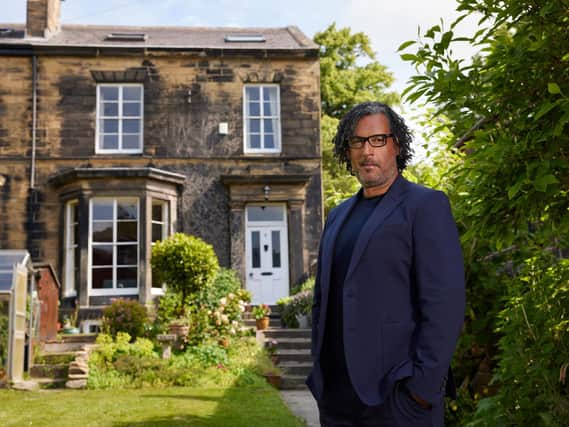A House Through Time is one of the best things on television, and here's why - Anthony Clavane


So, naturally, I am a bit biased when I say that A House Through Time is one of the best things on television.
I am also a bit biased when it comes to all things Leeds. So, naturally, I can confidently assert that the fourth series will be a triumph. For it is set in Yorkshire’s greatest city.
Advertisement
Hide AdAdvertisement
Hide AdWhat’s not to love? Actually, one of the reasons I love David Olusoga’s show is that it challenges bias, hyperbole and myth-making in general.
He is a big fan of the England men’s football team and would have enjoyed, I’m sure, the calm and good-humoured way Leeds United striker Patrick Bamford dismantled the myths about his own backstory earlier this week.
Throughout his career, Bamford has been cast as “Lord Patrick”, an over-privileged, too-posh-for-footie toff.
The idea that he was “born with a silver spoon in his mouth” – as one of his previous managers sneered – has steadily gained ground and dominated the press conference marking his first ever call-up to the Three Lions squad.
Advertisement
Hide AdAdvertisement
Hide AdOne journalist asked if he was fluent in four languages. Another wondered if his dad was a billionaire. A third speculated that his private school tried to make him to play rugby.
None of the above is true. “People have invented a lot of things,” he laughed.
The biggest invention about the city of Leeds is that it has never shrugged off its industrial past and has constantly failed to transcend its limitations
as a so-called provincial backwater.
This is part of the “grim up north” trope which still infects lazy, London-centric narratives about a place which has repeatedly reinvented itself since manufacturing, the basis of its 19th century growth, collapsed.
Advertisement
Hide AdAdvertisement
Hide AdI haven’t seen a preview of Olusoga’s examination of the Victorian villa in Headingley featured in the new series, but I have read that the themes will include the suburb’s rapid development during the Industrial Revolution, when it was attracting the growing middle classes, the impact of immigration in
the twentieth century and its evolution into a student area.
As in the three previous series, a large, six-bedroom home will become a kind of time machine used to explore various aspects of local, and national, history.
“I am not interested in the stories of the elite,” declared Olusoga. “We do enough kings and queens and generals and prime ministers.
Advertisement
Hide AdAdvertisement
Hide Ad“It’s not to denigrate that form of history, it’s just that there’s a lot of it being done already and I’m less interested in that than in the lives of ordinary people.”
This should be, in my view, the official role of history in schools. It should bring the past to life, uncover the stories of those who have long been marginalised, give a voice to those once deemed unimportant.
In this way, misconceptions can be dispelled and myths challenged. The 51-year-old historian has been dispelling misconceptions and challenging myths for the past two decades, in ground-breaking series such as Civilisations, The World’s War and Britain’s Forgotten Slave Owners.
So, roll on Tuesday night. I can’t wait to find out the stories of the residents who once lived at 5 Grosvenor Mount.
Advertisement
Hide AdAdvertisement
Hide AdThe idealistic Victorian lawyer who campaigned against the death penalty, the rise and fall of an aspirational millhand, the master builder whose famous dynasty built the County Arcade.
Apparently, the series ends with a group of University of Leeds graduates reuniting on the doorstep to reminisce.
They lived there in the 1990s, a decade when Olusoga himself studied as a post-graduate at Leeds Trinity University.
He spent a year living in Roundhay – the area where I went to school – and remembers (along with the inevitable “night-time memories of socialising”) how Leeds made a valiant bid to become a European powerhouse during that decade.
Advertisement
Hide AdAdvertisement
Hide AdEuropean powerhouse? This does not fit in with the received narrative.
To repeat, there are a number of misconceptions about Leeds – the city, and its football players – and I hope Olusoga clears them up when A House Through Time begins its latest run on Tuesday.